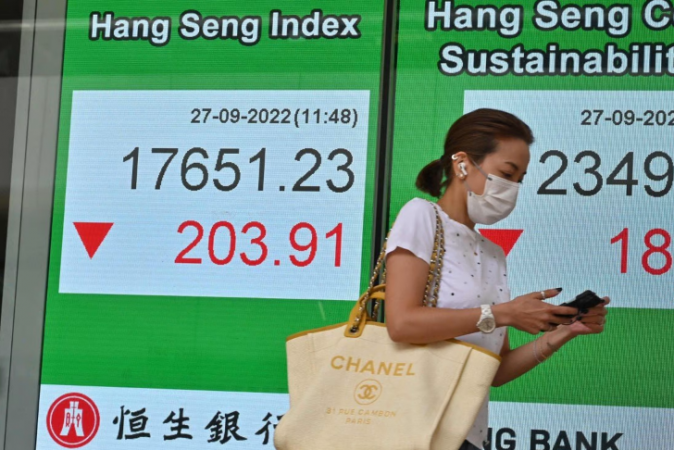
BEIJING: Hong Kong shares fell for the fourth day in a row and the benchmark index is on track to close below 17,000 for the first time in eleven years. As Beijing dashed hopes of an imminent reversal of its zero-Covid policy, worries about China's economic slowdown grew.
The Hang Seng index fell below the 17,000 mark for the first time since October 4, 2011, falling 1.6 percent to 16,948.51 in local afternoon trade. While the Shanghai Composite Index gained 0.4%, the Tech Index lost 3%. Stock prices fell in Taiwan, South Korea and Japan.
Meituan fell 6.5% to HK$150.90 and Alibaba Group Holding fell 2.7% to HK$76.55. Longfour Group, a Chinese developer, fell 6.4% to HK$20.45 and Country Garden fell 5.7% to HK$1.67. Geely Auto and its rival BYD lost more than 1.6%.
The Communist Party's mouthpiece, the People's Daily, said in a commentary on Tuesday that the zero-Covid policy is viable and the nation should maintain governance as it is necessary to maintain economic stability and safeguard lives.
The editorial was published on Monday, the day the country saw nearly 2,000 new coronavirus infections, and is the party's national congress this weekend.
Given the resurgence of COVID and tighter policy overseas, Zhang Yidong, an industrial securities strategist in Shanghai, predicted that "Hong Kong stocks will remain bearish."
"This time, the pandemic broke out and a weak housing market will make it more difficult for the economy to recover."
The country's largest commercial city, Shanghai, has increased the number of COVID hardening measures and is now in the metropolitan area to undergo three nucleic acid tests within three days after a new infection was reported outside quarantine on Monday. All new arrivals are required.
The Hang Seng Index experienced its worst quarterly decline since 2011 (21%). The loss of the 73-member index this year helped demolish the stock market worth US$1.5 trillion locally, according to data from Bloomberg.
Also Read: China now plays a new role in conflicts in Africa, no longer acting as a "passive observer"
After a better-than-expected US jobs report raised hopes of another big rate hike in November on Friday, local stocks fell 3% on Monday. Economists predicted ahead of a government report on Thursday that US consumer prices rose 8.1% in September, compared to 8.3% in August.
In Shenzhen, Modern Amperex Technology, China's largest producer of lithium-ion batteries for electric vehicles, saw a 5.3% increase to 413.67 yuan.
According to the company's filings, net income for the first nine months increased by 132 percent compared to the same period last year.
On the first day of trading in Shanghai, Suzhou K-Hiragawa Electronic Technology, a maker of useful battery equipment, rose 44% to 49.94 yuan. In its debut, Bide Pharmaceutical saw a decline of 19% to 71.11 yuan.
Also Read: Adani in talks to buy Jaypee Group's cement units for Rs5,000 cr
Other important Asian markets shrank. The Nikkei 225 in Japan, the Kospi in South Korea and the TaiX in Taiwan all experienced losses of more than 2%, with a sell-off in chip stocks coupled with the US's extended sanctions against China's tech sector.